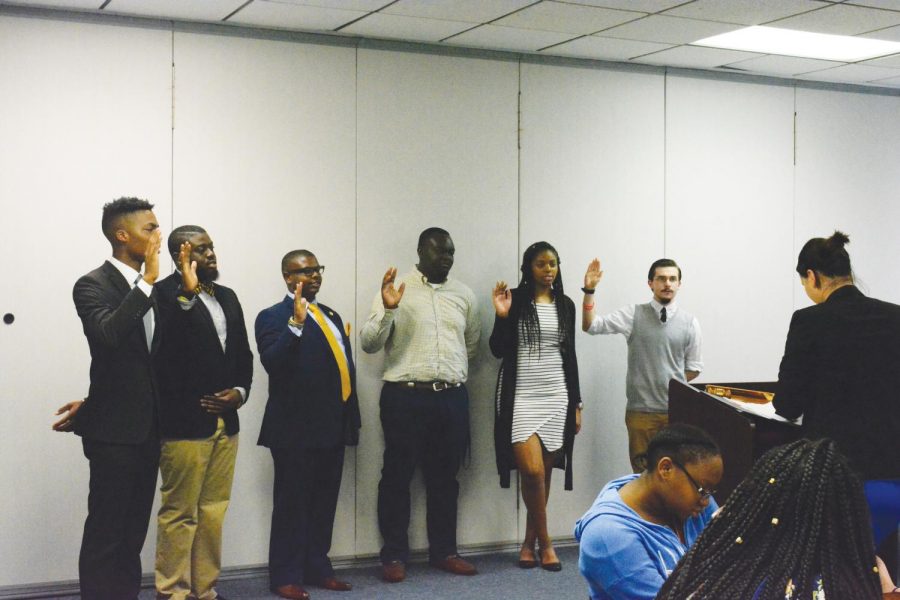Senators elected SGA representatives
Photo by: Caleb Reeves
Each year, SGA holds a vote for senate seats. The newly-elected senators swear in for their positions during the Oct. 12 SGA meeting.
Polls were open for two days in the Founder’s Hall Breezeway for FMU’s Student Government Association (SGA) senate elections. The organization counted a total of 204 student votes for five freshmen senate seats and two upperclassmen senate seats.
“It’s a few votes lower than normal,” Javon Kindred, SGA’s election commissioner, said. “We normally get about between like 250 to 300 votes, maybe 400 if it’s a good year.”
Connor Graham, last year’s election commissioner, said historically, fall semester’s voter turnout has been lower than the spring semester’s election. Last year, “The Patriot” reported a voter turnout of 200 for the fall 2016 election. Graham said last year’s spring elections approximately 300 voters.
“FMU in general, especially SGA, but even Homecoming, just has low voter turnout, and so we really have to come up with ways to get student involvement higher and student excitement higher,” SGA President Marcedes Smith said. “It’s just lack of interest I think.”
Kindred said SGA tried to bring attention to the upcoming elections by putting up posters and spreading information by word of mouth. Elections were also promoted on social media by official SGA accounts. Some senators used their personal accounts to promote the elections, but most responsibilities for promoting and executing the election were left solely to the election commissioner.
SGA elections are scheduled for each semester, but fall elections are held primarily for freshmen senate seats, according to Kindred. Upperclassmen may also run in the fall elections if there are open seats, but the spring semester elections are dedicated to fill upperclassmen senate seats and executive positions for the next academic year, Kindred said.
According to Graham, upperclassmen have had more time to network on campus and are able to translate that into votes. Kindred said because of this, the election ballot was comprised of mostly freshmen.
“A lot of people don’t vote, and if their friends aren’t running, typically they don’t vote,” Kindred said.
Kindred said SGA will more actively promote elections on social media to improve turnout in future elections.
According to Kindred and Graham, spring elections tend to have a higher voter turnout than fall elections. Graham attributed the higher turnout to more campaigning from those running for office.
“There is a lot of campaigning, especially to be the president,” Graham said.
The executive positions tend to promote more competition which increases voter awareness.
To promote awareness, Smith said SGA members wore new bright red SGA shirts designed to stand out on Thursdays. The shirts were created with University Programming Board earlier this year and displayed SGA’s Snapcode for Snapchat. Smith said the account grew to around 400 followers.
According to Smith, SGA has also started giving more surveys this semester to get feedback from students.
“If people aren’t going to come to us, we’re going to come to them,” Smith said.
Ryan Barker, a commuting student, said he was not aware of the elections, adding that he was not sure how SGA affected him as a commuter.
This year, students elected five freshmen senators, Alexander Bursch, Tyrell Rowell, Jasmine Brown, Kei’yonna Jordon and Jalen White.
The two upperclassmen spots were filled by Derek Martin and Jamison Montgomery.
According to Kindred, to boost turnout and make the elections more accessible to students, SGA is planning to create an online platform for the elections. SGA plans to have the online portal up sometime next year, Kindred said.
“As a Patriot, we do have the right to vote, and we want everyone to know that they are encouraged to vote,” Kindred said.
